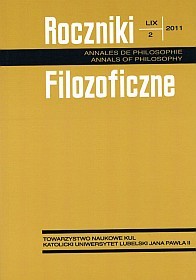British Crusading Atheism: Richard Dawkins’ Criticism of Religious Belief and God
Abstract
The paper investigates the category of religious faith, religion and God presented and criticized by leading British atheist – Richard Dawkins. He is a biologist but his writings on faith and religion are highly popular all over the world. Dawkins argues that any form of faith in supernatural reality is opposite to rational and justified scientific investigation. One cannot be a scientist and believe in God at the same time becausescience is based onrational premises and religious faith is not. He claims that religious faith is a source of all evil in the world. In his criticism Dawkins does not undertake serious discussions with any contemporary philosophers of religion or theologians but he invents his own notion of religious faith. It seems that Dawkins’ atheistic position is a sort of belief which does not differessentially from religious faith defined byhim as a belief in spite of, even perhaps because of, the lack of evidence.
In the paper some particular views of Dawkins are considered critically: a) a notion of religious faith, b) religious faith as a source of evil, c) a problem of existence and nature of God.
References
Anderson J.B. 1917: Religion and the intellect, „The Biblical World” 49 (1), s. 3-11.
Anderwald A. 2007: Teologia a nauki przyrodnicze. Rola wiedzy przyrodniczej w dociekaniach teologicznych, (Opolska Biblioteka Teologiczna 96), Opole: Redakcja Wydawnictw Wydziału Teologicznego Uniwersytetu Opolskiego.
Dawkins R. 1995: Reply to Michael Poole, „Science and Christian Belief” 7(1), s. 45-50.
Dawkins R. 1996a: A survival machine, [w:] J. Brockman (ed.), The Third Culture, New York: Touchstone, s. 74-95.
Dawkins R. 1996b: Samolubny gen, tł. M. Skoneczny, Warszawa: Pruszyński i S-ka.
Dawkins R. 1997: Is science a religion?, „Humanist” 57(1), s. 26-29.
Dawkins R. 2007: Bóg urojony, tł. P.J. Szwajcer, Warszawa: Wydawnictwo CiS.
Durkheim E. 1990: Elementarne formy życia religijnego: system totemiczny w Australii, Warszawa: PWN.
Ferraro K.F., Albrecht-Jensen C.M. 1991: Does religion influence adult health?, „Journal for the Scientific Study of Religion” 30(2), s. 193-202.
Frankel B.G., Hewitt W.E. 1994: Religion and well-being among Canadian university students: The role of faith groups on campus, „Journal for the Scientific Study of Religion” 33(1): 62-73.
Hattenstone 2003 http://www.guardian.co.uk/world/2003/feb/10/religion.scienceandnature [04.11.2009].
Herda J. 2007a: Dialog nauki i wiary – analiza wybranych stanowisk, „Roczniki Filozoficzne” 55(2), s. 5-19.
Herda J. 2007b: S.J. Goulda koncepcja rozłącznych magisteriów nauki i wiary, „Zagadnienia Filozoficzne w Nauce” 41, s. 46-55.
Hyman G. 2007: Atheism in modern history, [w:] M. Martin (ed.), The Cambridge Companion to Atheism, Cambridge: Cambridge University Press, s. 27-46.
Idler E.L. 1995: Religion, health, and nonphysical senses of self, „Social Forces” 74(2), s. 683-704.
Katechizm Kościoła Katolickiego 2002: Wyd. II, Poznań: Wydawnictwo Pallottinum.
Kowalczyk S. 2001: Filozofia Boga, Lublin: RW KUL.
Kuper A. 2000: If memes are the answer, what is the question?, [w:] R.A. Aunger (ed.), Darwinizing Culture: The Status of Memetics as a Science, Oxford: Oxford University Press, s. 175-188.
Martin M. 2007: General introduction, [w:] M. Martin (ed.), The Cambridge Companion to Atheism, Cambridge: Cambridge University Press, s. 1-7.
McGrath A. 2005a: Dawkins’ God. Genes, Memes and the Meaning of Life, Oxford: Blackwell Publishing.
McGrath A. 2005b: The Twilight of Atheism. The Rise and Fall of Disbelief in the Modern World. London–Sydney–Auckland–Johannesburg: Rider.
McGrath A., Collicutt McGrath J. 2007: Bóg nie jest urojeniem, tł. J. Wolak, Kraków: Wydawnictwo WAM.
Moskal P. 2000: Spór o racje religii. Studia z filozofii teoretycznej. Lublin: TN KUL.
Niebuhr H.R. 1994: O naturze wiary, tł. A. Gowin, „Znak” 464(1), s. 5-12.
Pennock R.T. 2007: Biology and religion, [w:] D.L. Hull, M. Ruse (eds.), The Cambridge Companion to the Philosophy of Biology, Cambridge: Cambridge University Press, s. 410-428.
Peters T. 2007: Models of God, „Philosophia” 35, s. 273-288.
Poole M. 1994: A critique of aspects of philosophy and theology of Richard Dawkins, „Science and Christian Belief” 6(1), s. 41-59.
Poole M. 1995: Response to Richard Dawkins’ reply, „Science and Christian Belief” 7(1), s. 55-58.
Rensch B. 1971: Biophilosophy, New York and London: Columbia University Press.
Ross C.E. 1990: Religion and Psychological Distress, „Journal for the Scientific Study of Religion” 29(2), s. 236-245.
Sedlak W. 1973: Biologiczne wartości religii, [w:] K. Wojtyła, P. Kałwa i in. (red.), Z zagadnień kultury chrześcijńskiej, Lublin: TN KUL, s. 643-650.
Steuer A.D. 1987: The Epistemic Status of Theistic Belief, „Journal of the American Academy of Religion” 55(2), s. 235-256.
Swinburne R. 2004: The Existence of God, Oxford: Clarendon Press.
Wilson A. 2007: Deluded by Dawkins? A Christian Response to the God Delusion, Eastbourne: Kingsway Publications.
Copyright (c) 2011 Roczniki Filozoficzne

This work is licensed under a Creative Commons Attribution-NonCommercial-NoDerivatives 4.0 International License.





